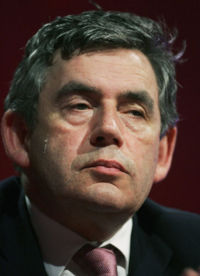Gordon Brown
 From Conservapedia
From Conservapedia | Gordon Brown | |
|---|---|

| |
| 74th Prime Minister of the United Kingdom | |
| Term of office June 27, 2007 - May 11, 2010 | |
| Political party | Labour Party |
| Preceded by | Tony Blair |
| Succeeded by | David Cameron |
| Born | February 20, 1951 Glasgow |
| Spouse | Sarah Brown |
| Religion | Church of Scotland |
James Gordon Brown, generally known as Gordon Brown, is the former Prime Minister of the United Kingdom and former leader of the British Labour Party. He succeeded Tony Blair in these positions in June 2007.
A Scottish Labour politician, Brown served as Britain's Chancellor of the Exchequer for ten years. His mutual enmity with former Prime Minister Blair was a consistent feature of British political life for a number of years.
Contents
History[edit]
In Britain, Brown is seen as being a more sombre, sober and serious figure in contrast to Tony Blair, who is regarded as charismatic and has at times been perceived as lightweight and as an overly "slick" media performer (not unlike Bill Clinton). This resonates with a stereotype that many English people have of Scottish people being humorless and dour. Brown's father was a Minister in the Presbyterian Church of Scotland, and it is thought that Brown's religious beliefs have influenced his serious, sober style. On the negative side, some believe that he is insufficiently likeable and sunny to appeal to voters. He has also been criticized for secretiveness, control-freakery and an awkward personal style. However, his communication skills, especially reading from autocues and being interviewed under bright lights in television studios, may be adversely affected by the fact that his eyesight is extremely poor. He is blind in one eye and his vision in the other is weak, owing to a sporting injury sustained when he was a teenager.
Brown was one of the longest serving Chancellors in history, and took credit for the consistently healthy state of the British economy during his tenure - credit which many are reassessing in light of the current (as of October 2008) perilous condition of the British economy. He is a passionate advocate of reducing poverty in the Third World. He has made speeches in which he has praised the concept of "Britishness" and suggested that the British should display the British flag outside their houses, as many Americans do with the US flag. However, his patriotic convictions are expected to have consequences in foreign policy which are arguably negative: it is widely believed that he will be zealous in defending British interests (narrowly defined), but that he will neglect broader elements of Tony Blair's foreign policy such as support for the United States and the War on Terror.
During Brown's tenure as Chancellor, the UK enjoyed sustained economic growth and generally positive reports from the International Monetary Fund, although there were concerns at extreme inflationary pressures in the housing market. These concerns were more than borne out by the collapse in the housing market and credit crunch of 2007–2008.
Brown followed a generally redistributionary policy, increasing spending in the National Health Service and education, and giving tax breaks to some poorer families whilst significantly increasing taxes on many others. His most significant achievement in the early days of the Labour Government was to grant fiscal independence to the Bank of England.
Just two days after the Brown ministry began, Islamic terrorists initiated several attempted attacks against the UK, consisting of two car bombs in London on June 29 and a suicide-bomb attack at Glasgow International Airport on June 30.
By the Fall of 2008, Brown's premiership was increasingly seen as catastrophic by the country as a whole and his own party. Labour's opinion poll ratings dropped to historic lows, with widepread predictions of a Conservative landslide at the next General Election. The events of early October 2008, gained him new respect, though not necessarily popularity, as he exercised cool, firm international leadership in the midst of the banking crisis. Opinion polls show that Brown's popularity is significantly lower than that of his main opponent, David Cameron, it is also alleged that he caused the "Credit crunch", the recession where the UK,supposedly owes more than HALF of their GDP, but local people say that no-one knows who we owe it to.
In 2020, 10 years after leaving office, Gordon Brown called for a "global government" to end the CCP pandemic.[1]
He has been married to Sarah since 2000. They have a daughter (deceased) and two sons.
Brown's legacy[edit]
Brown's legacy is that he left Britain with an enormous burden of debt through his use of the Private Finance Initiative (PFI) to conceal profligate public spending. The Spectator magazine (UK) has compared this to the Enron scandal. [2]
See also[edit]
References[edit]
| |||||
Categories: [Presbyterians] [Scottish People] [United Kingdom Prime Ministers] [Former Heads of Government] [British Politicians] [Former Members of Parliament] [Socialists] [Globalists]
↧ Download as ZWI file | Last modified: 02/20/2023 19:40:31 | 86 views
☰ Source: https://www.conservapedia.com/Gordon_Brown | License: CC BY-SA 3.0
 ZWI signed:
ZWI signed: KSF
KSF